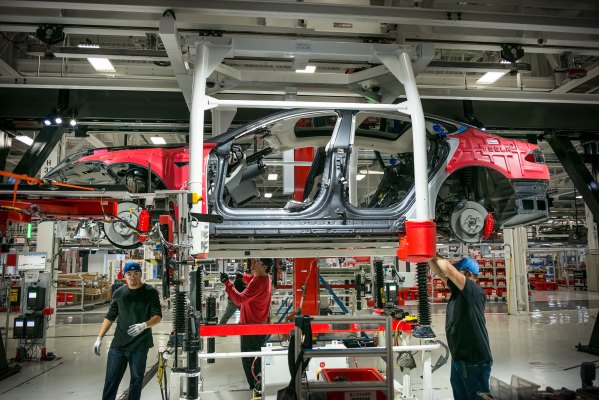Tesla veterans’ Industrial Next picks up $12M to automate EV production – TechCrunch

Elon Musk is unabashed about his obsession with manufacturing. Over the years, Tesla has gradually gained recognition in the manufacturing world through improving its production quality. Now two Tesla veterans want to share their smart factory know-how to other automakers through a nascent startup.
Industrial Next, founded by Allen Pan, who was Tesla’s autonomous factory lead at Fremont, and Lukas Pankau, who was a lead electrical architect behind Model X, Y and 3, aims to bring the latest production technologies to electric vehicle suppliers around the world, a vision that has helped it win investor support recently.
The startup just raised $12 million in a pre-Series A round led by Lenovo Capital, the venture capital vehicle of Chinese computer giant Lenovo, which owns IBM’s PC business. Xiaomi’s strategic investment arm and AlphaX Partners also participated in the financing round.
Notably, Industrial Next have been through both Y Combinator in the U.S. and MiraclePlus, the legacy of YC China, a move that has facilitated its global expansion.
In 2019, YC announced the closure of its China unit just a year after the incubator entered the country. Lu Qi, the renowned AI scientist hired to lead YC China, subsequently set up MiraclePlus, which was designed to operate through an independent fund and operational team but would still enjoy Lu’s ties with YC.
Industrial Next’s double-dipping appears to be the result of that arrangement. The startup joined YC after MiraclePlus suggested that it could “use YC as a launching pad” in the U.S. to broaden its customer base, according to a person with knowledge of the matter.
Some manufacturers have already shown interest in Industrial Next. The startup sells a mix of modular equipment, customized software, and follow-on service, which means clients can procure for one production unit or the entire factory.
More specifically, it’s equipping automakers with smart factory capabilities, such as sensing devices that run on edge computing, algorithms that can detect defects during production rather than after the fact, and a data framework that can timely inform designers of the production progress.
These elements altogether are supposed to give suppliers more agility at a time when heightened competition between EV upstarts are forcing factories to significantly shorten production cycles, adapt to changing demand, and scale production capacity.
The startup clearly looks to Tesla as a benchmark as it said to investors that it aimed to “improve on manufacturing technologies tested and proven by Tesla and transform the industry,” according to its pitch script on MiraclePlus’s demo day seen by TechCrunch. It has been in discussion with EV upstarts Rivian and Nio, as well as smart hardware OEM Huaqin and Wisetech for procurement, the pitch mentioned.

Pingback: Ufavision จุดเริ่มต้นสู่การเดิมพันระดับโลก
Pingback: เว็บพนันออนไลน์เกาหลี